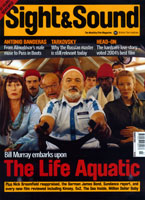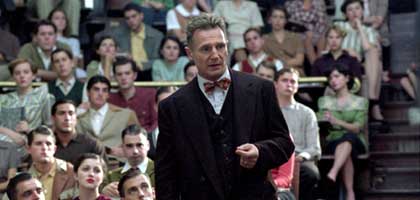
The professor of desire
Film of the Month: Kinsey

Leslie Felperin asks whether a new biopic of Alfred Kinsey, pioneer of the sexual revolution, can rehabilitate its subject as a libidinous American hero.
Towards the end of Kinsey, our hero (Liam Neeson) is addressing a room of tweed-suited academic types in a shadow-sliced auditorium. It's the mid-1950s, and his second book Sexual Behavior in the Human Female has been greeted with more moral outrage and opprobrium than he'd expected. McCarthyism is in full swing, and the nation, settling into Eisenhower-era conventionality after the social upheavals triggered by World War II, has not taken kindly to being told their wives, daughters and grandmothers masturbate, have extramarital sex and are sometimes even lesbians. "The forces of chastity are massing once again," thunders Kinsey from his pulpit of science, as his audience starts to drift out, presumably in disgust. Next thing we know, he's clutching his chest and dropping to the floor, seemingly turning into the sexual revolution's first martyr. (The rejection of his findings broke his already fragile heart, the film implies. That, and barbiturate abuse.)
His words about the "forces of chastity... massing" are the closest Kinsey comes to offering an ‘author's message'. They're addressed not just to those men and women in the room of the 1950s, but to us in the audience in the 2000s, a period experiencing, especially in the US, a distinct backlash against the tolerance of sexual difference for which Kinsey once fought with the sword of empirical research. And if you have any doubts about that, just spend ten minutes Googling Kinsey on the net, where you'll find all manner of frothing and fulminating against the film, its "gay activist" writer-director Bill Condon (one site compares him to - the horror! - documentarist Michael Moore), the real Kinsey, and the "perverted message" the movie promotes. "For its mocking treatment of decency and morality, Kinsey deserves box-office oblivion," writes Stephen Adams for online magazine Citizen ("A website of focus on the family," reads the strapline). "[The Kinsey legacy's] mainstreaming of promiscuity and perversion opened the way to the breakdown of the family and a flood of adultery, divorce, sexually transmitted diseases, illegitimate births, abortions, condoms in classrooms, the multibillion-dollar pornography industry, gay marriage and paedophilia."
Given this context, liberal-minded viewers may feel more forgiving of Kinsey's slightly plodding didacticism and its tendency to make a humanist hagiography out of its subject's life story. Sure, in classical-realist text fashion, it acknowledges Kinsey's character faults (it was based partly, among other sources, on the biography Sex The Measure of All Things: A Life of Alfred C. Kinsey by Jonathan Gathorne-Hardy). We see how his rebellion against his repressive and repressed Methodist schoolteacher father Alfred Seguine Kinsey (John Lithgow, never more deliciously pompous than when thundering in a pulpit against zippers, which allow "every man and boy speedy access to moral oblivion") spurred Kinsey to explore taboo subjects, but also how he inherited his father's domineering, patriarchal manner. Midway through the movie, we watch Kinsey in the kitchen with his family, growling at his teenage son for spending more time in the swimming pool than he does studying his biology textbooks. Kinsey's wife Mac (Laura Linney, excellent in the thinner part but hidden under an awful wig) has only to slip the word "engineering" into the conversation to remind him of the subject his own father thought was the only one worth studying.
That scene is just one example of the admirable economy of Condon's script, which packs a mass of information, observation and history into a well-edited two hours. Nearly every scene crams in at least two or three handy plot or character points and a quotable line or two, further proving in the wake of his previous foray into the genre - the story of horror director James Whale, Gods and Monsters - that Condon has a real knack for making biopics breathe. (His career so far has been marked by an unexpected swerve into upmarket respectability after dabbling in gothicism and horror with Sister, Sister, Strange Behavior and Strange Invaders.)
He also has an eye for witty detail. When Kinsey meets his shadowy other, a Casanova named Kenneth Braun (William Sadler) who claims to have catalogued his own conquests of 9,412 men, women, boys and girls and starts to demonstrate that he can go from flaccid to orgasm in ten seconds, the sexologist's dispassionate reaction is to check his watch. Even the potentially hokey framing device which threads through the movie, showing a middle-aged Kinsey being quizzed about his own history by his researchers (he occasionally breaks the spell to criticise their interviewing technique), works in this context because it deftly illustrates the Kinsey method for unlocking people's secrets, the last a word that echoes through the film like an umbral leitmotif.
The shadows are deepest when Kinsey turns film-maker himself. In order to study sexual pleasure in action, he begins making grainy, 8mm black-and-white (in fact more black than white) movies of willing subjects, his researchers and even himself in one threesome, pumping and sweating away. Condon seems to imply that this is the point where he started to go too far (the real Kinsey filmed the movies in his attic), and links it with the sexual shenanigans and partner-swapping that starts to tear apart his crew of helpers, once cheerfully described as the Fuller Brush Men of Sex.
For all the film's celebration of experiment and diversity - a biological certainty that Kinsey comes to understand through his study of the gall wasp - this is actually a very pro-couples, if not pro-monogamy, movie. When Kinsey gives in to his bisexual urges and begins an affair with Clyde Martin (Peter Sarsgaard, whose liquid eyes and wry mouth here could seduce any man or woman), he tells Mac more or less straight away. Even though later she will have an open affair with Martin herself, her initial reaction is tears, bewilderment and a sense of betrayal. Kinsey dismisses monogamy as a social restraint, but the movie seems to be on Mac's side when she suggests that maybe such restraints are there for a reason. Furthermore, the film leaves us in no doubt that the great love of Kinsey's life was Mac, his lover, cook, typist and helpmeet in one, who stood by her man right to the end. If that's not a Hollywood ending, what is?
In fact, for all its daring and felicitous touches, Kinsey is nevertheless the kind of ruthlessly conventional movie that seems designed to woo Academy Award nominations - though surprisingly the film has missed out on Oscar recognition. Note the old-fashioned expository montages and meaty central performance, here from a fine, if a little too deck-stackingly handsome, Liam Neeson, whose scene where his laughter about his father turns to tears is just the right 90-second length for excerpting on Oscar night.
There's not much point really in wishing that Kinsey were anything other than what it is, though we can be grateful there are no cheesy subtitles to round off the story, which concludes with an Edenic stroll in the woods by Alfred and Mac. Kinsey leaves ample room, in fact, for a possibly even more interesting story, perhaps told as a documentary, about how Alfred C. Kinsey did indeed start the sexual revolution only to become deeply unfashionable in the 1970s, when phenomenologically inclined sociologists and sexologists rejected his number-crunching, non-aetiological methodology. How and why his reputation as a pioneer and libidinous American hero of sorts might now be being restored, by this film among other factors, is perhaps the really interesting issue.
